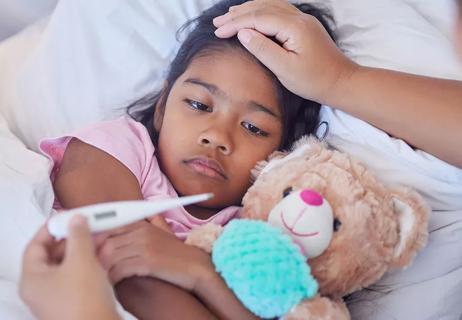All states require DTaP, MMR, polio and chickenpox vaccines — healthcare providers recommend others, too

Let’s face it, kids are germ magnets. And when you put them in school together, they’re going to get sick. It’s as simple as that.
Advertisement
Cleveland Clinic is a non-profit academic medical center. Advertising on our site helps support our mission. We do not endorse non-Cleveland Clinic products or services. Policy
But vaccines can keep them from getting serious illnesses that can be prevented. That’s why schools require students to have certain vaccines.
Just which vaccines are mandatory for school in the United States? And what else can you do to protect your child? Pediatrician Kim Giuliano, MD, explains.
Each state has laws regarding which vaccines are mandatory for kids to go to school. So, there are some variations in what’s required based on where you live. And the rules can change.
All 50 states currently require these four vaccines before students begin kindergarten:
Most states require Hepatitis B vaccination before kids enter kindergarten, too. Some also require Hepatitis A vaccines and pneumococcal vaccines. More than half require vaccination of older students (typically around seventh grade) against meningitis. A few require HPV vaccines for tweens or teens.
These laws typically apply to both public and private schools.
Check with your child’s school, their healthcare provider or your state’s laws before school starts.
It’s important to note that there’s a difference between the minimum vaccination requirements for kids to go to school and the full childhood immunization schedule set by the U.S. Centers for Disease Control and Prevention (CDC).
Advertisement
That’s why your child’s healthcare provider may recommend additional vaccines to meet those standards. That will start in their first weeks of life — long before they prepare for school.
“The longer a child goes without certain types of vaccines, the longer they remain susceptible to diseases that could cause problems,” Dr. Giuliano says. “We want them to be protected as young as possible with the vaccines that their bodies are equipped to respond to.”
The standard childhood immunization schedule includes the immunizations required for school, as well as vaccines that protect them against severe illness from:
“If they were to come in contact with one of these diseases and aren’t vaccinated, they may be more likely to have a severe case of — or devastating outcomes from — the illness,” she adds. “It’s important that we equip young bodies with the protection that they need to be able to fight off these organisms.”
Schools require vaccines for the same reasons healthcare providers advocate for them: They help protect children from serious illness.
Contagious illnesses can spread fast when people are in close contact. That’s just as true for the common cold as it is for measles.
But unlike a cold, the viral illnesses that vaccines protect you from can have severe consequences, like hospitalization, paralysis, pneumonia and — in severe cases — death.
“Vaccines help prevent really serious illnesses that can lead to long-term complications for children,” Dr. Giuliano says. “We give vaccines to prevent those most severe cases.”
Schools are full of young kids who share desks, cafeteria tables and bathrooms — all of which breed germs. They play tag at recess. They drink from each other’s water bottles, and they don’t always cover their coughs and sneezes.
If kids aren’t vaccinated, they may be more vulnerable to catching and spreading viruses. And if their classmates aren’t vaccinated, severe infections can spread like wildfire. When all or most kids in the school are vaccinated against a disease, it becomes harder for that virus to lurk in hallways.
State laws vary when it comes to requesting exemptions from mandatory school vaccinations.
All states allow families to request exemptions for medical reasons. Some kids have medical conditions, like a weakened immune system, that can make vaccines risky. But kids who can’t be vaccinated themselves can still benefit from being in a school with a high vaccination rate.
Advertisement
“It’s called herd immunity,” Dr. Giuliano explains. “If there’s a very high rate of vaccination within a population, like a school, it can help to protect vulnerable populations that can’t be vaccinated themselves.”
Other families may seek to request exemptions for religious or philosophical reasons. Those aren’t recognized in all states.
What’s more, the laws regarding individual vaccines can vary. For example, you may be able to request exemption from one vaccine on a religious basis, but not other vaccines. Additionally, some states will require parents to undergo vaccine education programs before being allowed religious or philosophical exemptions. Some exemptions will need to be renewed periodically.
Check with your school and review your state laws to understand what exemptions are permitted in your area.
Sticking to the recommended vaccination schedule is the best thing you can do to keep your child safe from highly contagious and dangerous infectious diseases, Dr. Giuliano says.
Waiting until school is around the corner can leave them susceptible in their early years. And some vaccines require multiple doses — given months or years apart — to provide full protection. So, planning ahead matters.
Advertisement
“Vaccines are given at strategic ages, where we know that a child’s body is going to be able to mount an appropriate antibody response and an antibody response that’s going to stick with them,” she explains. “We want to give them that protection before they run the risk of contracting the illness.”
If you’re concerned that your child isn’t fully vaccinated or if you have questions about getting mandatory vaccines for school, talk with their healthcare provider.
“If you have specific questions, it’s always best to talk to your child’s pediatrician or family medicine physician,” Dr. Giuliano advises. “We’re there to help parents raise healthy children and separate facts from fiction.”
Advertisement
Learn more about our editorial process.
Advertisement

Preschool age is typically between 3 and 5 — but readiness may matter more

Asking questions, creating routines and setting schedules can help get students back on track

School can be stressful, even anxiety-provoking — get to the root of the concern and enlist help when needed

A well-balanced lunch should include a protein, whole grain, fruit and vegetables, and a healthy snack

‘Active shooter’ exercises may raise both awareness and anxiety

Focus on a positive mindset, strong study habits and healthy living

Vomiting and fevers are a hard no — other symptoms are a judgment call

College is a time of big transitions, intense stress and major lifestyle changes

The tropical fruit is a good source of antioxidants and vitamin C

Most people fall asleep within 10 to 20 minutes, but if your experience is different, adjusting your sleep schedule may help

Exploring your hidden side can lead to better understanding of what makes you tick